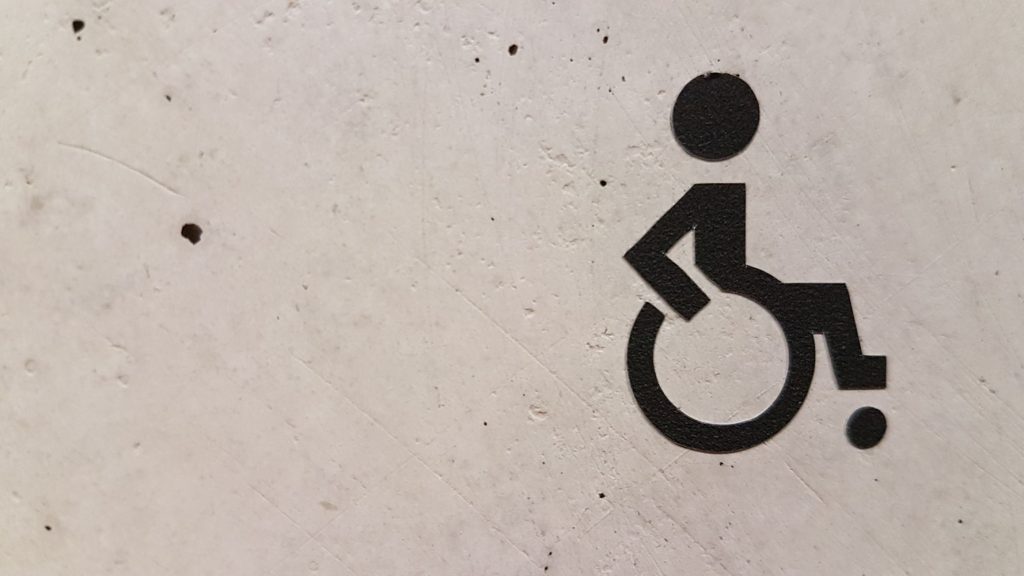Policy on aid for students with disabilities lacks adequate care
3 min read
Lack of accessibility and lack of proper policy under students with disabilities. (@mariannebos | unsplash.com)
By CALEB PICARD
Staff Writer
During 2019, a health crisis arose that ended with me in a wheelchair for the second half of the spring semester. Monoplegia is the paralysis of one limb and can be either temporary or permanent. During that time after my contraction of monoplegia, I was greeted by an unprecedented amount of unhelpful policies as well as a sense of restriction by both the campus and from the school as an entity. UMW, through policy and red tape, are not nearly as accommodating as they should be for students with disabilities.
The first day after returning to campus I had the rude awakening that the hills and bricks that riddle the campus are quite unwelcoming to a newcomer in a wheelchair. Even with assistance from friends and roommates, some hills on campus were near impossible. This alone caused a great deal of issues for me, especially since I had to scale the towering hill by the Anderson Center to get to my residence on the fourth floor of Eagle Landing.
On flat ground, the campus was not much more welcoming. The brick façade that is ubiquitous within the campus caused more problems than expected. At some points the bricks would even cause the tire to separate from the wheel, leaving me stranded.
When asked if the Office of Disability Resources is able to help individuals with transportation needs, their response was, “It is the individual’s responsibility to acquire appropriate assistive devices/adaptive equipment or personal aid to meet their needs. ODR is not available to provide individual mobility assistance to students.”
Without assistance, many parts of the campus remained impossible to get to. Even ignoring the grass that litters campus, the amphitheatre, Marshall Hall and Seacobeck were all off limits for the wheelchair, while other places like Eagle Landing remained tediously essential for me to get to.
When asked about how ODR could support someone in need, they responded that, “The supports offered are through guidance and advising about things that are important to know and plan for or assistance with getting connected to appropriate supports.” This shows that ODR is more focused on being a figurehead for disability services than actually providing the physical help that is essential.
Disability Resources gave me no assistance throughout all of the time I spent in the wheelchair, refusing to even touch the wheelchair out of fear of a possible lawsuit. This, for me, this was the straw that broke the camel’s back. This UMW policy continued to be unwelcoming and unhelpful, with my only assistance coming from friends who sacrificed their own time to assist me getting to and from class.
Even in some classes I felt unwelcome. Many of the lecture halls were unwelcoming to me, where I was forced to either sit with the professor or so far back that gaining anything from class was almost impossible. I was stranded and felt like I was going in circles, even going so far to think about withdrawing from university with only a few weeks left in the semester.
On April 6, 2019, Eagle Landing had a pipe burst early in the morning. With the fire alarms blaring, I knew what would come next. Being on the fourth floor, I was forced to crutch down the four flights of stairs with my paralyzed leg dragging behind me, hearing it thud down each stair. After waiting outside for what felt like an eternity, policy again came in to play with the mob of RAs stopping anyone from leaving. While other people snuck away, knowing that what happened was more than a standard fire drill, I was left to balance on crutches as we waited to hear anything. With no place to go and no wheelchair, I was trapped waiting behind Eagle Landing for hours in the early morning. Even after the alarms went off, I remained stranded with my wheelchair up four flights of stairs in a quarantined Eagle Landing.
Throughout the time I spent in a wheelchair at UMW, it became blatantly obvious that the University was more concerned about finances and possible lawsuits than they were about their students. This experience was one unlike any other because it allowed me a glimpse of how unfriendly our school’s policies are to many of those with disabilities. To be truly accommodating, UMW needs to rethink their policies on students with disabilities. So much more can be done to show you care.


